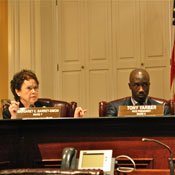City government is rarely accused of acting quickly. The Jackson City Council is working hard to assure that remains true.
Procedure requires most council ordinances to spend at least two weeks in committee and causes a large number of them to remain on the agenda for months, if not years. The council has recently taken the slow-moving style of local government to the micro level as well.
At the Tuesday, April 17, regular council meeting, members spent more than 14 minutes inquiring about and discussing the procedure for an honorary renaming of a street. The proposed action, to rename the portion of Campbell Street from Dr. Martin Luther King Drive to the dead end to Dr. Gene "Jughead" Young Drive, was sent to the Planning Committee. Ward 3 Councilwoman LaRita Cooper-Stokes requested that the proposal be brought back to the Council in two weeks for a vote.
Council President Frank Bluntson and Ward 6 Councilman Tony Yarber objected, saying honorary renaming already follows a process, which requires more than two weeks to complete.
After nearly a quarter of an hour discussing the process with the city attorney's office, the council found that the proposal could not be voted on in two weeks, because a public notice must run in the local newspaper for two consecutive weeks prior to the vote, and the deadline to submit the notice is Monday.
One Too Many Mornings
The Council voted 5-1 at the same meeting to move special meetings from 10 a.m. to 4 p.m., effective immediately. Cooper-Stokes, who has been a proponent of eliminating the special meetings in favor of weekly regular meetings, was the lone dissenting vote.
Special meetings are held on Mondays that are not followed by one of the biweekly regular meeting on Tuesday. The special meetings often consist only of a vote on the claims docket and pay roll.
Council attendance has been poor at best in recent months. The move from 10 a.m. to 4 p.m. will help fix the problem, Ward 7 Councilwoman Margaret Barrett-Simon said.
"It not only is more convenient for the council members, it allows the staff and our policy analysts to do work on Monday that will be beneficial to us at the 4 o'clock meeting. Having gotten the agenda at 5 o'clock on Friday and having to do the analysis by staff folks by 10 o'clock on Monday morning has been very difficult for them," Barrett-Simon said.
Cooper-Stokes, whose attendance at Monday meetings has been sparse since she joined the council in March, was the only council member absent at the 4 p.m. meeting Monday.
Fortification, Finally
Hemphill Construction Company of Florence won the bid for a Fortification Street facelift. The City Council voted 5-1 April 17 to approve an $8.9-million contract with Hemphill for the makeover.
The contract now goes to the Mississippi Department of Transportation for approval.
If MDOT approves the contract, the city expects construction to begin in late May. The project will improve 1.2 miles of Fortification Street from Greymont Avenue to Farish Street.
The plans include repaving the street and converting the stretch from Greymont Avenue to Jefferson Street from four lanes to three, with a dedicated turn lane in the center. The conversion will make room for new, ADA-compliant sidewalks along the entire 1.2-mile stretch.
Barrett-Simon has pushed for the project, which is in her ward, for years. When it was announced at City Hall, Ward 6 Councilman Tony Yarber tried to take to the right to move that Barrett-Simon knew she'd earned.
"So moved," Yarber said.
"No you can't," Barrett-Simon quickly replied, creating a roar of laughter in the council chambers.
"So moved," she said. "This is a historic day, and I am so happy to see this item before us. I thank every one of you who had anything to do with it, including my colleagues who've helped push hard—including Mr. Yarber who is going to cut yards for me to help meet with the funding, because he's so distressed about the condition of the street.
"This is an important project for our city, and I'm very pleased to see it before us today."
The project will also include six new traffic signals, traffic-monitoring cameras and supporting fiber-optic cables, decorative light fixtures along either side of the street, new streets signs, and relocation of all overhead utility lines to an underground vault. The renovation will also include a 24-inch water main on Jefferson Street to replace one of the oldest mains in the city.
City, state and federal funds will help cover the $8.9 million project. About $2 million will come from the state Economic Development Highway Grant Program, and the city will cover between 20 percent and 25 percent of the total cost, Mayor Harvey Johnson Jr. Said.
Cooper-Stokes was the only dissenting vote. Ward 1 Councilman Quentin Whitwell had left the chambers before the vote to attend his daughter's musical performance.



Comments
Use the comment form below to begin a discussion about this content.